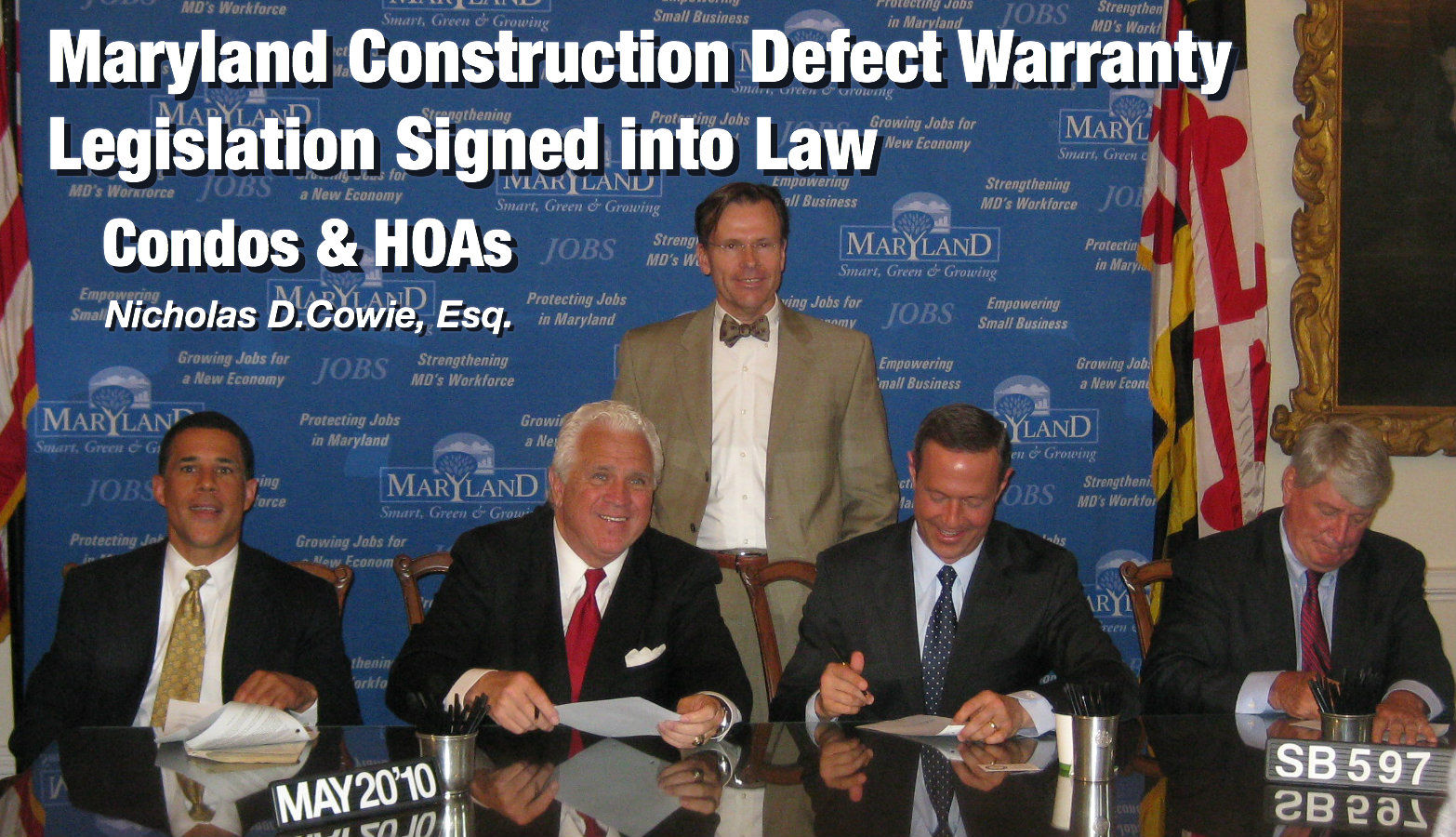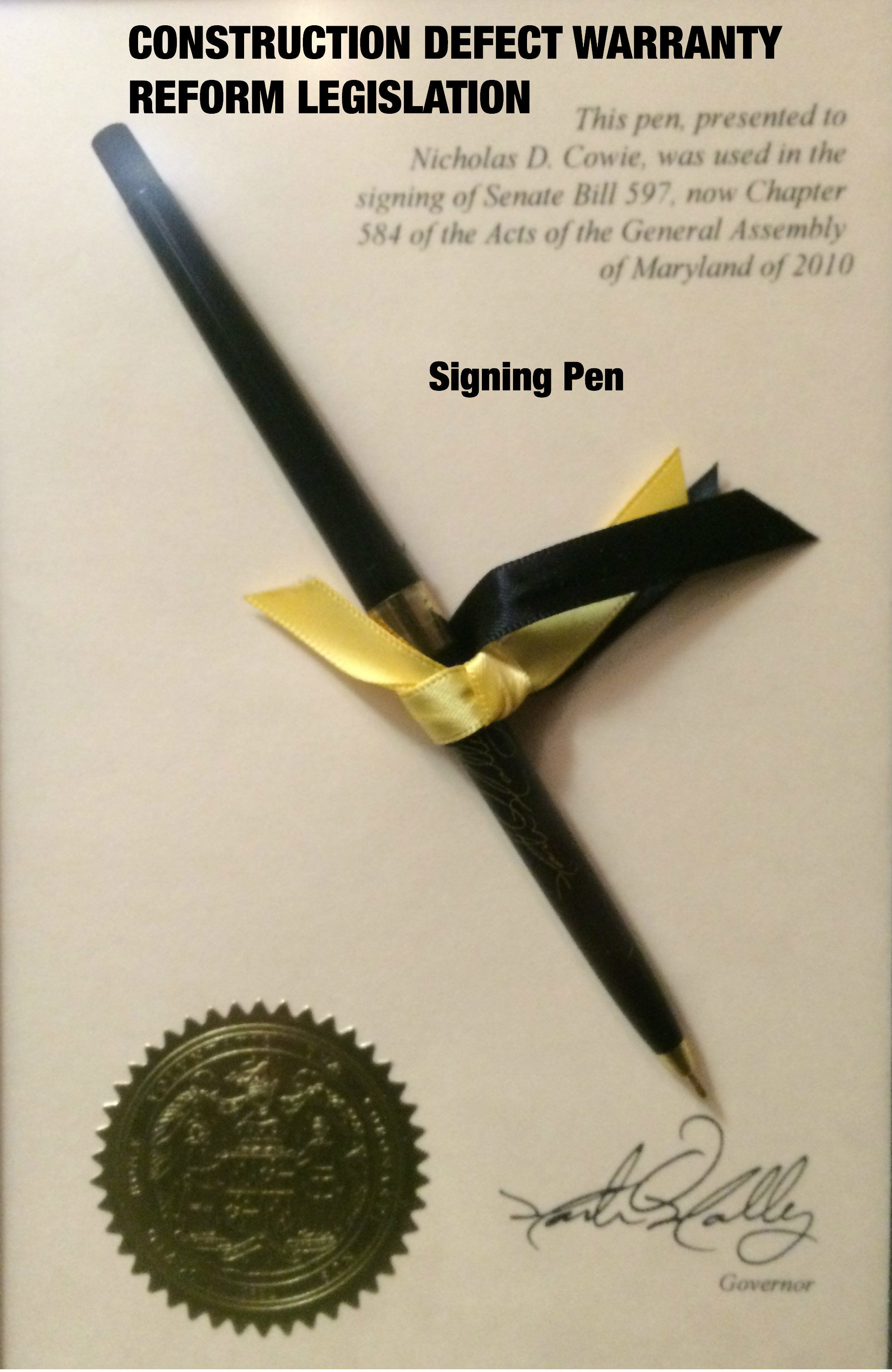
Nicholas D. Cowie Drafted the Warranty Reform Legislation that Closes Loopholes and Extends Warranties for Condos and HOAs
In the Photo above Mr. Cowie is present for the signing of the legislation SB 597 into law and was subsequently presented with the signing pen.
All condominium associations and homeowners associations (“HOAs”) created in Maryland 0n or after October 1, 2010 are subject to new laws pertaining to statutory warranties for construction defects in workmanship and materials.
Most associations that have recently transitioned, or that are about to transition, from developer to homeowner control were created on after October 1, 2010. It is now time for these Associations to become familiar with the new laws to ensure they protect and preserve their warranty rights. Below is an Article I wrote regarding theses new laws, which I helped create. See Blog Post : “Maryland Construction Defect Lawyers Enforcing Warranty Claims for Condominiums.”
Too often our firm is contacted by condominium associations who never knew what there warranty and other legal rights were until it was too late to seek developer repairs and reimbursement for construction defects. There is no reason for community associations to remain uniformed.
Cowie Law Group, P.C. offers a free document review and warranty analysis for HOA and condominium association boards concerned with construction issues. Specifically, we will review the Association’s documents and meet with the Board at the community, without fee or obligation, to discuss:
- The various statutory warranties and other legal rights that apply with regard to construction defects at your community and when they expire;
- The importance of obtaining a timely building transition study to identify all defects and bring them to the developers attention before warranties expire
- A strategy for your community to preserve warranty rights while negotiating proper repairs with the developer
As discussed in the Article below condominiums associations and HOA’s created after October 1, 2010 have a minimum of two years to give a developer notice of a construction defect claim under the common element and common area warranties provided by Maryland’s Condominium and HOA Acts. However, that is just the “tip of the ice burg” when it comes to analyzing an given communities’ legal rights and how they should proceed. There are many valuable claims that may expire at an earlier date if timely action is not taken. Condominium and HOA construction defect matters constitute a very complex area of law and an association should consult with attorneys having extensive experience in this field.
Below is an article I wrote describing the new warranty reform laws I drafted that amend the Maryland statutory implied warranties for Condos and HOAs as originally set forth in the Maryland Condominium Act and the Maryland Homeowners Association Act:
” WARRANTY REFORM LEGISLATION COMES TO MARYLAND
By Nicholas D. Cowie, Esq.
I recently had the privilege of drafting warranty reform legislation that was passed unanimously by the Maryland General Assembly and signed into law by Governor O’Malley, effective October 1, 2010. The legislation, known as Senate Bill (“SB”) 597, is intended to close “loopholes” that unfairly deny homeowners associations (“HOAs”) and condominium associations the protections afforded by statutory implied warranties for construction defects in new residential communities.
Succinctly put, SB 597 achieves the following:
- Extends the implied warranty periods when developers retain control of HOAs and condominium associations for long periods of time so that warranties cannot expire before homeowners take control of the association.
- Closes the loophole that allowed condominium developers to designate association-maintained, common building systems (e.g., roofs, exterior walls, foundations, etc.) as being part of specified units so that the common element warranty protections would not apply. In effect, redefining “common elements” as “units” to defeat the association’s common element warranties.
Below is a brief description of the warranty “loopholes” and how SB 597 will change the Maryland Real Property Article (“RP”) in order to close those loopholes.
Extension of Warranty Period When Developers Retain Control of the Association for Extended Periods of Time
The warranties applicable to homeowners associations under RP §11B-110 and condominium association under RP §11-131(d) require that the developer be given notice of common area defect claims within the warranty period. These particular warranties do not apply unless such notice has been given. When developers are in control of the association they do not typically investigate or make warranty claims against themselves. In some cases, developers retain control of the association until after the warranty period has expired or is about to expire. Senate Bill 597 modifies the warranty period so that it cannot expire until at least two years after control of the association is transferred to the homeowners. This will ensure that the initial homeowner-controlled association will have a fair opportunity to evaluate and investigate the common areas and give the statutorily required warranty notice to the developer should any construction defects exist in a newly constructed community.
Requiring that Shared Condominium Building Systems be Designated as Common Elements and Not Units
It has become an increasingly common practice for condominium developers to illogically define association-maintained, shared roofs, exterior walls and foundations of multi-family condominium buildings as “units” with the sole purpose of creating a “legal fiction” under which they can argue that the “common element” RP §11-131(d) warranty does not apply. For example, a developer will define the boundary of the units on each floor to extend to the outermost exterior surface of the building adjacent to the unit living space (including the brick, siding and paint). Similarly, the boundaries of each unit on the top floor are defined by the developer to extend upward to the outermost surface of the exterior roof (including the shingles). Thus each unit owner owns a small section of the building exterior immediately adjacent to their unit living space, including brick, siding and roof shingles! In such condominiums, the entire building exterior is made up of patchwork of units, much like a checkerboard. Creating a nonsensical condominium like this allows developers to argue that the association’s warranty on the common elements does not apply to the building exterior should it start leaking.
By amending RP §11-103(a)(4), SB 597 prohibits this practice by requiring that “all roofs, foundations, external and supporting walls, mechanical, electrical and plumbing systems and other structural elements” be designated as “common elements” (and not “units”) to the extent that such improvements “are shared by or serve more than one unit or serve any portion of the common elements”. Thus, going forward, all shared portions of a multifamily Condominium building, such as the roof, will be common elements and clearly covered by the “common element” warranty in RP §11-131(d).
NOTE REGARDING AUTHOR:
Nicholas D. Cowie, is a member of the WMC CAI and CRC CAI and a partner in the law firm Cowie Law Group, P.C. After drafting the original legislation, Mr. Cowie worked with Delegates Frush and Braveboy, Senator Rosapepe, and the Department of Legislative Services to incorporate amendments that ultimately became Senate Bill 597. Mr. Cowie organized groups of affected homeowners and worked with community association organizations, such as the CAI LAC, to provide written and oral testimony in support of SB 597 at committee hearings before the Maryland Senate and House of Delegates.”
Maryland Construction Defect Lawyers
The application of warranties is a complex area of law. All newly formed, unit owner-controlled condominium associations should contact a Maryland lawyer who has extensive experience handling construction defect matters on behalf of condominium associations for a free consultation as to how the various statutory warranties apply and when the expire so that the association can make informed decisions about protecting its statutory warranty rights to have a condominium free from construction defects.
Maryland Construction Defect Lawyers
410-327-3800
1321 Generals Highway, Suite 302, Crownsville, MD 21032


4 thoughts on “CONDO & HOA CONSTRUCTION DEFECT WARRANTY LAWS IN MARYLAND – Amendments that Extend Warranties for Condominiums and Homeowners Associations Transitioning from Developer Control”